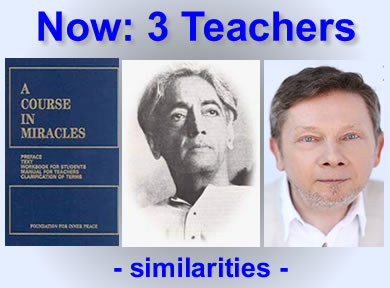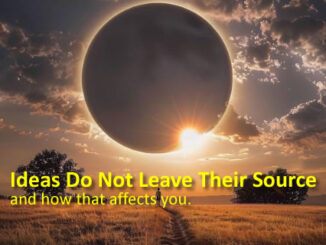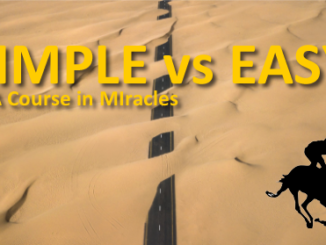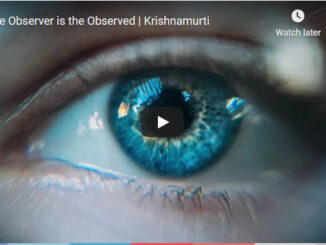
The NOW From Three Teachers
The ‘now’, or the eternal present instant, is the only space we ever are in reality. Paradoxically, the context in which we use the word ‘we’ refers to our ego mind, which has become crippled by its dependence on thought (a product of the past), which is based entirely on the past, or on the projected past… which is the future. The ego mind (as opposed to our universal mind) is incapable of being in the present ‘now’. This one observation, obviously true, presents us with a frustratingly simple challenge…why we are we simply unwilling or incapable to experience the present now? We treat the now as an unimportant gap between the past and the future to be avoided… but the past is gone…and the future never arrives. But the reality is we are evermore in the ‘now’, which we refuse to recognize.
What is insanity, if not this?
I’d like to look at the concept of time from the perspective of three of the greatest world teachers of our time… A Course in Miracles, Jiddhu Krishamurti, and Eckhardt Tolle. I believe all are saying the same thing on this topic with different words, the Course from a vastly broader array of teachings, and Krishnamurti and Tolle from their respective teachings which are not only very similar, but emphasize the ‘now’ as one of, or in Tolle’s case, their primary concept.
/////////// A Course in Miracles: (Chapter 13 – The Function of Time) /////////////
(Note: For brevity I’ve deleted some sentences in the second and third paragraph below, in order to focus on our comparison with K and Tolle.)
T-13.IV.4. The ego has a strange notion of time, and it is with this notion that your questioning might well begin. 2 The ego invests heavily in the past, and in the end believes that the past is the only aspect of time that is meaningful. 3 Remember that its emphasis on guilt enables it to ensure its continuity by making the future like the past, and thus avoiding the present. 4 By the notion of paying for the past in the future, the past becomes the determiner of the future, making them continuous without an intervening present. 5 For the ego regards the present only as a brief transition to the future, in which it brings the past to the future by interpreting the present in past terms.
T-13.IV.5. “Now” has no meaning to the ego. 2 The present merely reminds it of past hurts, and it reacts to the present as if it were the past. 3 The ego cannot tolerate release from the past, and although the past is over, the ego tries to preserve its image by responding as if it were present.
T-13.IV.7. It is evident that the Holy Spirit’s perception of time is the exact opposite of the ego’s. 2 The reason is equally clear, for they perceive the goal of time as diametrically opposed. 3 The Holy Spirit interprets time’s purpose as rendering the need for time unnecessary. 5 His emphasis is therefore on the only aspect of time that can extend to the infinite, for now is the closest approximation of eternity that this world offers. 6 It is in the reality of “now,” without past or future, that the beginning of the appreciation of eternity lies. 7 For only “now” is here, and only “now” presents the opportunities for the holy encounters in which salvation can be found.
/////////// Jiddhu Krishnamurti (The First and Last Freedom: Question 24 – On Time) //////////////
(Note: Again, I’ve selected only a few statement from among many)
Page 241: Now, can thought be free of time? That is, thought which is the result of time, can it stop and be free from the process of time? Thought can be controlled, shaped; but the control of thought is still within the field of time and so our difficulty is: How can a mind that is the result of time, of many thousand yesterdays, be instantaneously free of this complex background? You can be free of it, not tomorrow but in the present, in the now. That can be done only when you realize that which is false; and the false is obviously the analytical process and that is the only thing we have. When the analytical process completely stops, not through enforcement but through understanding the inevitable falseness of that process, then you will find that your mind is completely dissociated from the past – which does not mean that you do not recognize the past but that your mind has no direct communion with the past. So it can free itself from the past immediately, now, and this dissociation from the past, this complete freedom from yesterday, not chronologically but psychologically, is possible; and that is the only way to understand reality.
///////////// Eckhardt Tolle (The Power of Now: Page 48-49) //////////////////
To be identified with your mind is to be trapped in time: the compulsion to live almost entirely through memory and anticipation. This creates an endless preoccupation with past and future and an unwillingness to honor and acknowledge the present moment and allow it to be. The compulsion arises because the past gives you an identity and the future holds the promise of salvation, of fulfillment in whatever form. Both are illusions.
Time isn’t precious at all, because it is an illusion. What you perceive as precious is not time but the one point that is out of time: the Now. That is precious indeed. The more you are focused on time – past and future – the more yo miss the Now, the most precious thing there is.
Why is it the most precious thing? Firstly because it is the only thing. It’s all there is. The eternal present is the space within which your whole life unfolds, the one factor that remains constant. Life is Now. There was never a time when your life was not now, nor will there ever be. Secondly, the Now is the only point that can take you beyond the limited confines of the mind. It is your only point of access into the timeless and formless realm of Being.
/////////////////
Being in the ‘Now’ without the mind dissipating its energy on pursuit of the past, or future, results in another form of vision. Tolle calls this ‘being in the now’ or ‘presence’, Krishnamurti may have referred to it as ‘seeing what is’ in what I am assuming from ACIM can be called ‘Christ’s vision’.
ACIM Lesson 159 Paragraph 5:
Christ’s vision is the bridge between the worlds.
////////////////
This has been a very short comparison of descriptions of ‘Now’ between these three teachers. I think from it, and from the large volumes of literature from all three referring to similar aspects of time, we can assume that the key to freedom is the ability to be in the ‘Now’, which requires total presence which necessarily involves the cessation of thought.
Now, to do actually do it. I do not personally think it is possible for thought to stop thought. Krishnamurti speaks at great length about the ‘observer is the observed’, and the necessity of seeing the falseness of our pursuits of thought. He suggests that when we see clearly the falseness of thought, it comes to an end of itself. The paradox is that the pursuit of these goals makes them impossible, as the pursuer is the pursued. It is only by the indirect observation of ourselves with ‘choiceless awareness’ and understanding how we operate that we can clearly see what we are doing… and by this seeing, of itself thought ends and the Now rushes in.





Be the first to comment